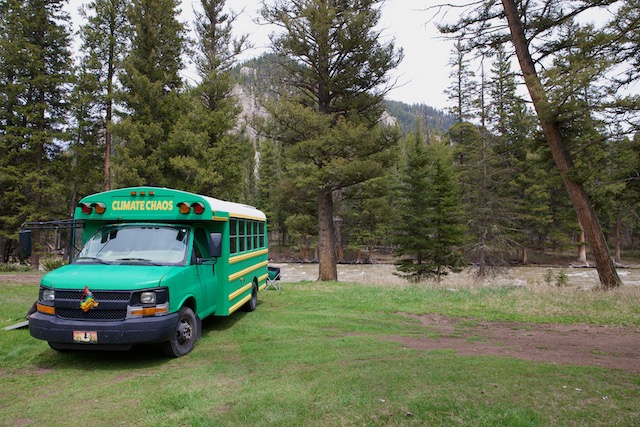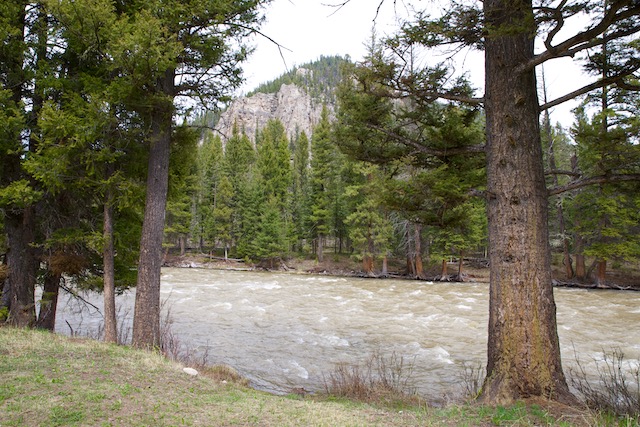Climate Chaos Becomes Inescapable
[Update: 6/11/23 – Yesterday was my 66th birthday. The bastards in Port Townsend shut down my summer space, emulating the entire west coast by making life illegal. And it rained. Meanwhile, the climate chaos smoke hit the Northeast. Chris Hedges explores the meaning of that (far better than my despairing rant):
- Requiem for Our Species ~~~ end update]
It rained really hard Wednesday night, with hail that covered the windshield and lightening that terrified the dog.
Given that I was parked on soft muddy ground before the rain even started and the Gallatin River – less than 20 feet away and maybe 12 inches below my rear wheels – was running furiously fast bank to bank full with snowmelt, I started to worry if I would be flooded out or unable to get out of the mud in the morning. Oops!
This storm was the latest in a series of setbacks and disappointments in our spring migration.
It was too cold on Mingus Mountain. The heat drove us out of the valley in Cottonwood, Az. The tourists were thick in gorgeous Sedona so we drove right on through. Our gorgeous mature ponderosa pine forest campsite in the Coconino National Forest just outside Flagstaff was closed due to huge winter snowfall and mud. Heat drove us out of Marble Canyon. The north side of the Grand Canyon was closed until June 2 due to record snowfall. All the forest service roads into Kaibab NF were blocked by snow.
All symptoms of Climate Chaos.
But getting smoked out of Gallatin River in the National Forest was a whole new experience.
I’ve been extremely lucky over the last 7 years of rambling western lands in narrowly missing the western wildfires and smoke. (I was in Paradise Ca. just before the massive wildfire and we were lucky to not die in the record PNW 117 degree heat wave). Only once was I caught in smoke in Oregon, and a drive of 100 miles or so south got me out in a few hours.
But the Gallatin smoke is regional. Huge. Inescapable.
Little did I know that it originated hundreds of miles north in British Columbia.
For me, the smoke began in the Gallatin River valley (just north of West Yellowstone) on Wednesday night. I actually thought it might be morning fog on Thursday after a cold night of hard rain.
Thinking it was smoke from a local fire, I headed north towards Bozeman to get away from it.
For months now, I had been slowly meandering north up the mountain, with plans to visit Banff (BC, Canada) and loop west across Canada down to the summer spot on Puget sound.
I don’t follow the news or the weather and was unaware of the massive wildfires in British Columbia just north of Banff.
Well, I sure found out the hard way. It was not a local fire.
The choking smoke on Thursday as I travelled Rt. 191 into Bozeman was incredible – you could not see any mountains and visibility was about a half a mile.
I overnighted in the Walmart and this morning it wasn’t any better. I didn’t even go into town. I just got the hell out of there.
I can’t tell you how horrifying this kind of smoke is.
And the physical effects – burning throat, shortness of breath, watering eyes, constant headache – are the smallest part of it.
It is incredibly depressing. It creates an overwhelming sense of oppression and inability to escape. An almost panic like sense of choking and helplessness (“I can’t breath!”). Everything beautiful and that you love just completely destroyed.
Not only no fun, but impossible to be outside. No escape. Living hell. Anger. Rage. Despair.
I drove over 200 miles west to Missoula to get over the continental divide in hopes of escape.
But it’s just as bad here right now, but even worse, because it’s 85 degrees and it will be 95 tomorrow in central Washington where I’ll probably end up before I can make my way west across and get some relief up on Puget Sound PNW Cascadia.
Climate Chaos sucks. And it’s becoming completely inescapable.
[End Note: I listen to the BBC overnight and am usually half asleep, so can’t provide details, but I heard 2 incredible stories this morning:
1) Canadian researcher spoke about how arctic warming was causing a slow down in the jet stream and how that led to extended high pressure heat domes, which are contributing to the British Columbia record wildfires;
2) another scientist (U Florida) doing west coast Pacific Ocean work found that changes in temperature were leading to changes in stratification, which in turn has an impact on the deep deposit and storage of carbon from algae and small predators (krill). There also were changes in rates of photosynthesis, light penetration, and carbon sequestration. There could be a huge reduction in the role of oceans in storing carbon. Huge implications of that. (PS – This science is not new. Ocean warming, acidification, and changes in habitat, currents, and migratory patterns were primary reasons why we wrote legislation to create a science based Ocean Protection Council back in 2007, including public involvement in that science and policy).


